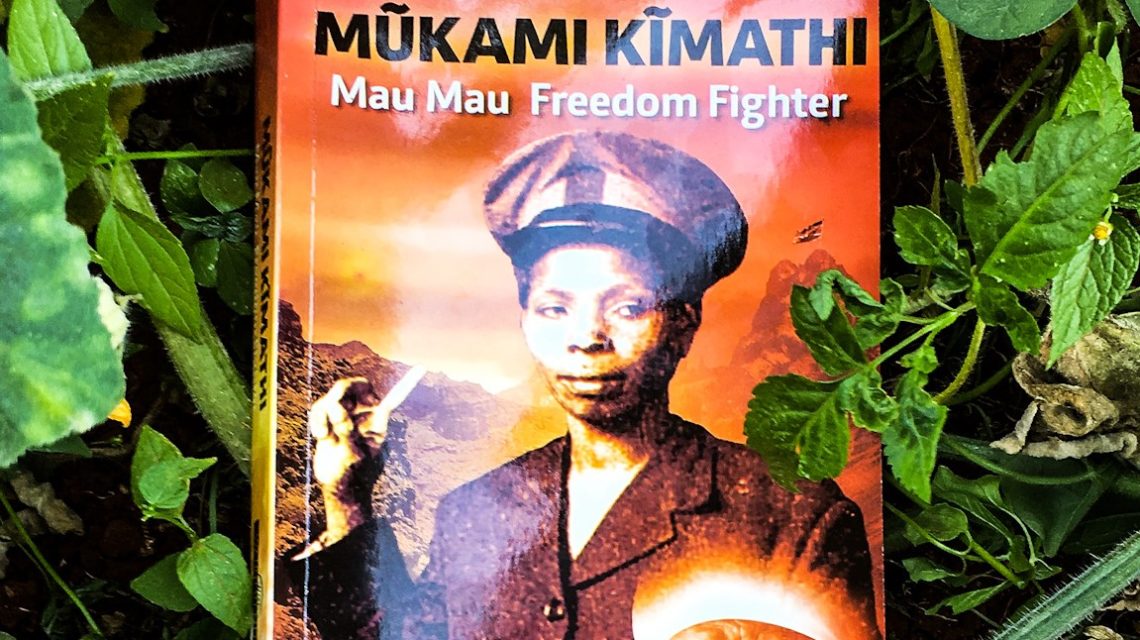Mukami Kimathi – The Mau Mau Freedom Fighter March 30, 2020 – Posted in: Review – Tags: dedankimathi, KenyanAuthors, KenyanBooks, kenyanhistory, mukamikimathi, mukamikimathithemaumaufreedomfighter
This review and feature image is a contribution from Glynis Maina as authored and published on her blog on May 29th, 2019
Being the wife of a Freedom Fighter may look like a walk in the park where your husband’s name seemingly opens all doors for you and make things right. This book however shows how in about 65 years our freedom fighters are still not well documented historically. It corrects the belief that women stayed home as men went to the forest to fight. Women also fought, Mukami having been one of them and her fight was not just in the war but in keeping her husband’s name alive.
Don’t get me wrong, I can already feel you rolling your eyes thinking this is another feminist manifesto that you don’t approve. It isn’t. It’s nowhere close to one. It is simply a documentation of history from pre-colonial and post-colonial Kenya. It is the story of Mukami Kimathi and her family. A family that has been through everything just to make sure they never lived on their knees.
The beauty of the book is that it is a narration. The author Wairimu Nderitu doesn’t try to retell the story, she simply transcribes over 60 interviews including the smallest interjections. She doesn’t leave out expressions made it Kikuyu, she simply translates them for any one who may not understand. If anything this is all raw oral tradition meeting the light of day.
There are various themes in the book. Largely political. From colonialism to torture and it boils all down to family. Mukami is a wonderful narrator. She constantly reminds you why she was part of the Mau Mau, why she fought for liberation. Why even though they won the war and she continued to suffer she never regretted her decision. Why she didn’t lose hope when she lost her husband.
She’s the narrator, not the Morgan Freeman read a script narrator, nope, she’s the narrator of her own story. she called her story karugano. And it genuinely feels like the raw truth. She talks about the bitter sweet relationship with her father and draws a line on how the frustrations of the colonialist rule resulted in domestic violence in homes. How her father, being a home guard and her future husband being a Mau Mau Marshall posses a unique dilemma in her life.
So do we choose love, or do we choose family? Her father wouldn’t let her get married to the Mau Mau leader not when he was continually rising up the ranks in the colonial administration. But Dedan, oh you’ll love him. He’s a reader, as smart as they come, he’s beautiful, he doesn’t have the money other suitors have but he has the charm and the love of God. Mukami herself at some point didn’t want to be with him. Their love story is definitely one you’ll laugh through.

We all know that Kimathi dies, that’s the part the textbooks didn’t leave out. I won’t say how, you also know that, but it’s a solid Judas moment the betray just slaps different in this book. It explains the photo where Dedan has his hands crossed over his chest. You’ll hate the reality of how things pan out, you’ll want to blame the writers, same way we blame the game of thrones writers for the ending. But this isn’t fiction crafted in the minds of men. It’s the history of a country made by men who fought for land and freedom in forests barely surviving the harsh conditions there and being killed by colonialists.
The story dispenses a lot of myths, these people who go around saying they are Mau Mau and took the oath aren’t the true Mau Mau . Real oath takers never say it. It shows the conflict in being a home guard and Mau Mau. It wasn’t as easy as I’ll be part of the Mau Mau and life will be great. Home guards also had their stories to tell. They needed money to pay taxes to the colonialists and to take their children to school. It’s easy to sympathize with the home guards unfortunately, just a bit. Some even helped the Mau Mau because deep down they knew what they were fighting for. Land and Freedom.
Racism, discrimination and abject poverty aren’t unfamiliar themes. The book also explains how rape was used as a weapon of war and subjugation, alongside use of jiggers to cripple communities. It really is not a beautiful story. Not until the joy of independence.
In 1963, the Kenyan flag is hoisted and the war seems over. But even as the Mau Mau wish a black man seats on the throne, they soon realize that the only people who know how to run the government are the home guards and loyalists. The home guards in turn get the land the Mau Mau have fought for. Soon after the second liberation begins, one for the recognition of the rights of Kenyans. One for the recognition of Freedom fighters as just that, and not terrorists as they were labelled by colonialists. A status only rectified in 2003 by Mwai Kibaki’s administration 40 years later.
You’ll love this book on how historically rich it is. You’ll feel Mukami’s pain as she struggles through abject poverty, post traumatic stress and loneliness upon the loss of her husband. I guarantee you this book will make you angry. It’ll boil the rage in you, because you’ll realize how wrong history has been. You’ll see how damaging it is when only the victors write our history. It’ll help you see there’s always more than what meets the eye.
Don’t leave your highlighter when you read this. The book has a picture gallery that has more than one picture of Kimathi, newspaper articles cutting across almost seven decades with annexes to back up the evidence, it’s very well researched for any history junkie. Various chapters have prologues by renown authors, giving context from their books and further validating the contents of the chapter. To break the narration by Mukami various people in her life take over the narrations, mostly her children and even her students in the final chapter who visit her later in life, they all bring a new perspective to the story.
If you have gaps in your Kenyan history, here’s a mwakenya covering 7 decades from a person who lived it herself.
Format: Paperback
Publisher: Mdahalo Bridging Divides Limited
Published: 2017
Genre: African History
Setting: Kenya
Pages: 307
Price: Ksh. 1200
To purchase your copy click here: Book Duka: The African Bookstore

